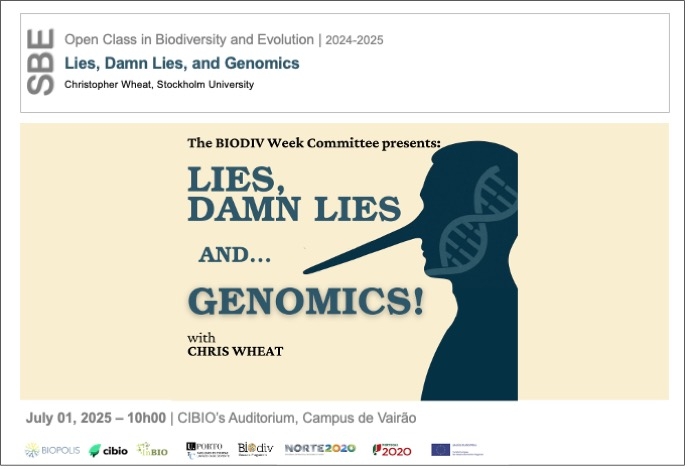Lies, Damn Lies, and Genomics
01 Jul 2025 - Christopher Wheat, Stockholm University | 10h00 | CIBIO’s Auditorium, Campus de Vairão

OPEN CLASS IN BIODIVERSITY AND EVOLUTION
Genomic tools have revolutionized our ability to investigate biological questions at unprecedented resolution, but with this power comes a responsibility to critically assess the data, methods, and inferences we produce. In this talk, I explore how assumptions, batch effects, and analytic flexibility can lead to erroneous conclusions even in high-profile publications, and how such pitfalls are often hidden beneath layers of statistical confidence and computational output. By highlighting real examples from ecological genomics, I show how different aligners, priors, and analytical choices can drastically alter evolutionary interpretations, particularly those involving selection inference, trait association, and comparative genomics. From replicate failures in model organisms to challenges in inferring soft sweeps and gene function, I argue that many of the strongest claims in the literature rest on methodological ground that is less stable than it appears. Using case studies ranging from butterflies to sticklebacks to large-scale genome consortium datasets, I emphasize the importance of cross-validation, independent replication, and reanalysis as essential tools in genomic science. I also reflect on my own lab’s work, where seemingly solid genotype-to-phenotype associations revealed unexpected layers of complexity when examined more closely. In sum, this talk offers a critical, and ultimately hopeful, reality check for genomic researchers. Our goal is not to distrust data, but to better understand its limitations and to refine our questions, designs, and interpretations in ways that make us better scientists.
Christopher Wheat is a professor of population genetics at Stockholm University, working at the intersection of ecological and evolutionary genomics to investigate how organisms adapt in the wild. His research focuses on identifying and studying genetic variation that has fitness consequences, spanning microevolutionary to macroevolutionary timescales. His work integrates multiple disciplines, including molecular biology, population genetics, physiology, biochemistry, ecology, and systematics. Also combining a wide range of methods, from traditional fieldwork with butterfly nets to modern 'omics approaches such as genome and transcriptome sequencing, and CRISPR-Cas9 gene editing. Butterflies are the primary model system in his lab due to their central role in ecological and evolutionary theory and the availability of advanced genomic resources and functional tools, enabling robust connections to be drawn between genotype and phenotype.
[Host: BIODIV Week Committee]